Robynson Surname Ancestry ResultsOur indexes 1000-1999 include entries for the spelling 'robynson'. In the period you have requested, we have the following 119 records (displaying 71 to 80): Single Surname Subscription | | | Buying all 119 results of this search individually would cost £638.00. But you can have free access to all 119 records for a year, to view, to save and print, for £100. Save £538.00. More... |
These sample scans are from the original record. You will get scans of the full pages or articles where the surname you searched for has been found. Your web browser may prevent the sample windows from opening; in this case please change your browser settings to allow pop-up windows from this site. Shitlington Lay Subsidy: Final Return
(1545)
The lay subsidy of Agbrigg wapentake in the West Riding of Yorkshire (207/186) is in two parts: the anticipation and the final return. The subsidy, assessed at 1d in the pound on goods up to £5, 2d in the pound on goods worth £5 and above, and 2d in the pound on land, had been granted by parliament to king Henry VIII for three years. The anticipation, certified by the commissioners 30 April 1545, listed by township the holders of £6 or more in land or £10 or more in goods 'which said persons by virtue of our souerayng lords most jentill request and lovyng desire ar content frankly, quietly and indeladby to pay ther last payment' in advance, by way of anticipation of the third year's payment. The final return, certified 26 October 1545, lists the less wealthy part of the population, again by township, with their full names, assessment of their property, and (right-hand column) the amount due to be collected from them.ROBYNSON. Cost: £4.00.  | Sample scan, click to enlarge
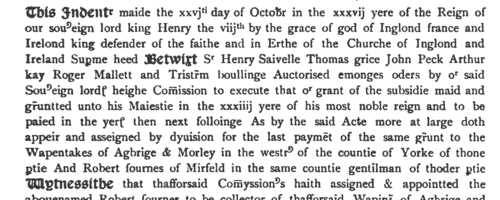
| Sowerby Lay Subsidy: Anticipation
(1545)
The lay subsidy of Agbrigg wapentake in the West Riding of Yorkshire (207/186) is in two parts: the anticipation and the final return. The subsidy, assessed at 1d in the pound on goods up to £5, 2d in the pound on goods worth £5 and above, and 2d in the pound on land, had been granted by parliament to king Henry VIII for three years. The anticipation, certified by the commissioners 30 April 1545, listed by township the holders of £6 or more in land or £10 or more in goods 'which said persons by virtue of our souerayng lords most jentill request and lovyng desire ar content frankly, quietly and indeladby to pay ther last payment' in advance, by way of anticipation of the third year's payment. The final return, certified 26 October 1545, lists the less wealthy part of the population, again by township, with their full names, assessment of their property, and (right-hand column) the amount due to be collected from them.ROBYNSON. Cost: £4.00.  | Sample scan, click to enlarge
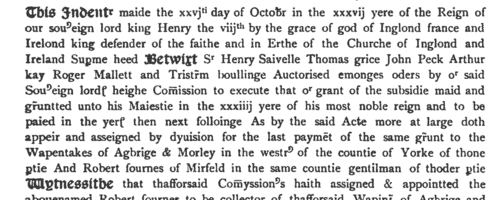
| Freemen of London
(1540-1550)
The long series of mediaeval registers and books of admission of the freemen of London was destroyed by fire in 1786. Thirty surviving charred leaves were gathered together and rebound, becoming Egerton MS 2408 in the British Museum. The order is jumbled and generally speaking none can be dated with certainty, although all belong to the very end of the reign of Henry VIII and the start of the reign of his son, Edward VI. These are pages from the admission books. Each entry here usually gives the name of the person admitted to the freedom; his father's name, address and occupation; his entitlement to the freedom, usually by having served out an apprenticeship to a citizen, naming the master and his trade. Then there may follow a cross-reference to M. or N., being two volumes of another set of official books denoted by the letters of the alphabet, and following each other in chronological sequence, which evidently gave details of entries into apprenticeships. These other books no longer exist: but the dates given for entry do identify the start of the apprenticeship, and so give by implication a date for the eventual admission to freedom. In the margin is the name of the city ward and the total of the fee and fine paid on admission.ROBYNSON. Cost: £4.00.  | Sample scan, click to enlarge

| Boys entering Sedbergh School
(1546-1550)
B. Wilson prepared this edition of the register of the Grammar School at Sedbergh in the West Riding of Yorkshire, published in 1895. Sedbergh school had three exhibitions at St John's College, Cambridge, and for the earliest years little more could be found about the pupils at the school than was recorded at St John's or other colleges. In 1700-1706 the first material from Sedbergh appears, but no more than lists of surnames. From 1746 onwards full names, or surnames and initials, are found for those boys who did not continue to university. It is only from 1820 onwards that the school register starts to give detail: month of entry, age, birthplace, and month of leaving. From then onwards Wilson was able to add more and more biographical detail, except, of course, for those boys in 1895 still at the school or with their careers yet ahead of them.ROBYNSON. Cost: £4.00.  | Sample scan, click to enlarge
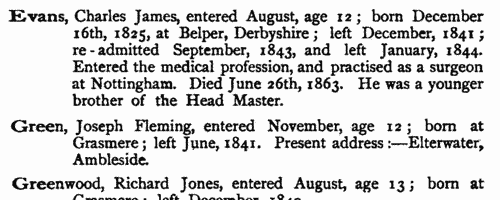
| Retired monks, nuns and chantry priests in the east Midlands
(1547-1551)
Lists of pensions being paid to monks, nuns and chantry priests in the diocese of Lincoln after the dissolution of the monasteries and chantries. The diocese covered Bedfordshire, Buckinghamshire, part of Hertfordshire, Huntingdonshire, Leicestershire and Lincolnshire. Oxfordshire, Northamptonshire and Rutland, which had been shorn from the diocese, are not covered by these returns.
ROBYNSON. Cost: £6.00.  | Sample scan, click to enlarge

| Officers of the Royal Household
(1553)
King Edward VI died 6 July 1553 and was buried 8 August following. The accounts of the funeral expenses were prepared by sir Edward Waldegrave, knight, one of queen Mary's privy coucil, and master of her Majesty's great wardrobe. The expenses included the purchase of 'blacke clothe boughte for the buriall' to furnish mourning for every officer and servant of the late king's household, and these accounts list all the officers, department by department, by name. Most officers were provided with 4 yards of cloth, and their clerks and servants 3 yards each: greater dignitaries were allowed from 7 to 16 yards; sir Edward himself received 10. The total cost of the 9,376 and a half yards of cloth was £5946 9s 9d.ROBYNSON. Cost: £6.00.  | Sample scan, click to enlarge
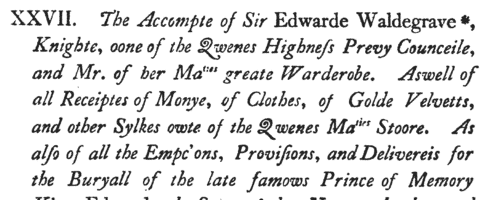
| Tenants, founders and incumbents of Lancashire chantries
(1546-1554)
Chantries were established to perform services for the souls of their founders and other faithful dead, including annual obits and anniversaries at which alms were usually distributed. The chantries could be at an existing altar in a parish church, a new altar in a side chapel of an existing church, in a new chapel in the churchyard or some miles from an existing church: few were founded before 1300, and most date from 1450 to 1500. Hospitals were places provided by similar foundations to receive the poor and weak; there were also religious guilds, brotherhoods and fraternities, and colleges (like large chantries at which three or more secular priests lived in common). An Act of Parliament of 1545 gave king Henry VIII the power to dissolve such chantries, chapels, &c., the proceeds to be devoted to the expenses of the wars in France and Scotland. Commissioners were appointed 14 February 1546 to survey the chantries and seize their property, and from 1546 to 1548 the commissioners produced these certificates giving brief details of the establishment and nature of each foundation, with an inventory of valuables and rental of lands. The individuals named in the certificates are thus the founder, the present incumbent, and the tenants whose rents provided the chantry's income. All the surviving certificates for Lancashire were edited by the Reverend F. R. Raines for the Chetham Society, and published from 1862.ROBYNSON. Cost: £6.00.  | Sample scan, click to enlarge

| Tradesmen of York
(1272-1558)
No man or woman could trade in the city of York without having obtained 'freedom' of the city.Their names were recorded on the 'Freemen's Roll', or Register of the Freemen of the City of York, which contains about 19,900 names for this period. A list of names was prepared for each year, the year being here reckoned as starting at Michaelmas (29 September) until 1373, and thence at Candlemas (2 February). Each annual list starts with the name of the mayor and the camerarii or chamberlains. The chamberlains were freemen charged with the duty of receiving the fees of the new freemen; of seeing that only freemen traded in the city; and of preparing this roll, which was compiled from the names on their own account books from the receipts for the fees. There are three groups of freemen: those who obtained freedom after serving out an apprenticeship to a freeman; the children of freemen; and those who claimed freedom by 'redemption', i. e. by purchase or gift from the Mayor and Court of Aldermen.
ROBYNSON. Cost: £2.00.  | Sample scan, click to enlarge

| Liegemen and Traitors, Pirates and Spies
(1556-1558)
The Privy Council of king Philip and queen Mary was responsible for internal security in England and Wales, and dealt with all manner of special and urgent matters
ROBYNSON. Cost: £4.00.  | Sample scan, click to enlarge

| Common Pleas: Lincolnshire
(1558)
Pleas at Westminster Michaelmas term, 5 & 6 Philip & Mary and 1 Elizabeth, 1558. The court dealt with civil cases: debt, detinue, slander, assault, theft, breach of covenant, formedon, novel disseisin, &c. Each case is marked in the margin with the name of the county to the sheriff of which the writs were issued. Most often, but not necessarily, this would be the county of residence of the defendant. This calendar of the original formulaic record in abbreviated Latin on parchment has been made by David Bethell, preserving all individual detail from each case. The Latin text is translated: English phrases and passages are preserved literatim, in bold. CP 40/1176 mm.1-100ROBYNSON. Cost: £8.00.  | Sample scan, click to enlarge
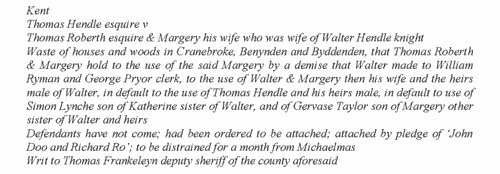
|
Research your ancestry, family history, genealogy and one-name study by direct access to original records and archives indexed by surname.
|












